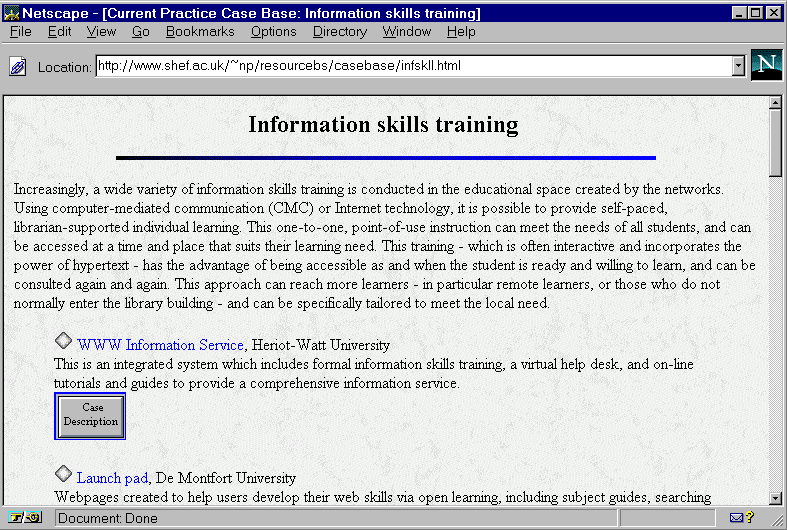Networked Learner Support Current Practice Case Base
A new addition to the NetLinkS website is the Current Practice Case Base: [http://netways.shef.ac.uk/rbase/intro.htm]
This current awareness resource provides links to relevant sites demonstrating networked learner support (NLS) in the UK and abroad. As you are probably aware, NetLinkS is an eLib training and awareness project which aims to encourage the further development of NLS practice within UK higher education, through promoting the development of a networked professional learning community. NLS is the term we have adopted to refer to the use of networked technologies to provide training or other forms of help to users of electronic information resources. For example, user education, information skills training, and general advisory help can be carried out in the networked space. We hope that librarians, IT and teaching professionals, and staff development officers will all use this resource to inform themselves about current NLS activities using Internet and computer-mediated communication technologies. More importantly, we hope that this resource will provide inspiration for learner support professionals to adopt some of these approaches in their own institutions.

The Case Base forms part of the NetLinkS Resource Base. The Resource Base is currently being developed by the NetLinkS team, and will include:
- current awareness reports (trends in NLS and networked learning, technologies for NLS, and organisational and professional issues),
- links to projects, papers and resources relating to NLS, and
- archives of the guest speaker discussions taking place on our mailbase list, nls-forum.
The first guest speaker in our programme of online conferences is Sheila Creth, University Librarian at the University of Iowa Libraries. Sheila is currently presenting and chairing a discussion on "reference services in cyberspace", which is stimulating a good exchange of information and perspectives.
The aim of the Current Practice Case Base is to:
- develop awareness and activity in NLS,
- inform learner support professionals about current NLS initiatives, by providing examples of current practice from both the UK and internationally,
- provide a simple interface to access these sites,
- be a flexible, expandable learning environment,
- provide links to sites that the learner support community can explore, before returning to the resource base,
- add value to these links, by providing case descriptions written by NLS practitioners themselves,
- provide a facility for comments, feedback and recommendations from the users of the resource base,
- provide a facility for users to inform us about their work, for possible inclusion.
By drawing attention to current NLS initiatives, we hope to stimulate change in the way that academic institutions support today's learners. It is clear from the Case Base that there is already much activity taking place. However, there is a need to share experience and ideas for developing the practice more widely. We have categorised current NLS activity using the following headings:
- Online enquiry services
- Information skills training
- Supporting use of subject resources
- Supporting distance education
- Supporting teaching
- Evaluating NLS services
The types of service that you can expect to find under these headings include:
- electronic reference services,
- self-help guides in the use of electronic resources,
- learner-centred online information literacy modules,
- online tutorials in the use of electronic resources,
- subject-specific hypertext links, and course specific webpages or training programmes,
- details of projects supporting distance learners or particular courses,
- user feedback facilities.
As the Case Base grows - and, with input from the NLS community, it will - we expect that this categorisation will change. However, we do not want the Case Base to be a bland list of external links; we hope to add value to these links by including "case descriptions", written by the people who have implemented these initiatives, so that it is possible to see how the service has been developed, and how it works in practice. The Case Base already includes a number of UK case descriptions; several of the international sites included in the Case Base have also expressed an interest in describing their work.
We are keen to expand the Case Base, and if you would like to tell us about your own NLS activities or write a case description, we would very much like to hear from you. In order to ensure the case descriptions are of a similar format, we have created a form with section headings. Beneath these headings are a number of points that NLS practitioners may wish to consider when describing their service. These guidelines are available through the website: [http://netways.shef.ac.uk/rbase/casedesc.htm]. If there is a site that you think should be included, please feel free to contact me, Sarah Ashton (s.j.ashton@sheffield.ac.uk). Similarly, if you would like to comment on any aspect of this resource or the NetLinkS site, I'd like to hear from you.
